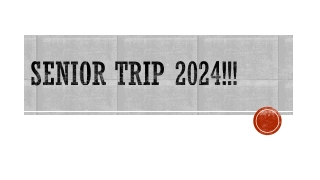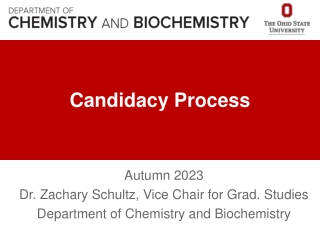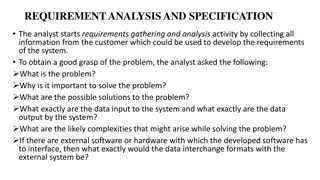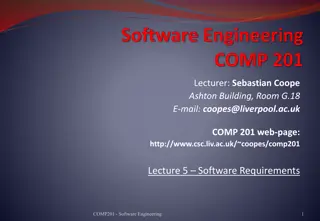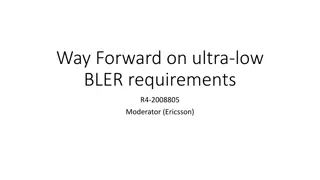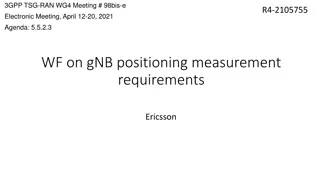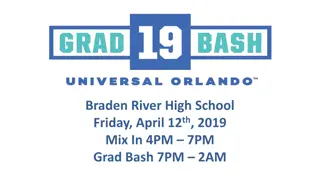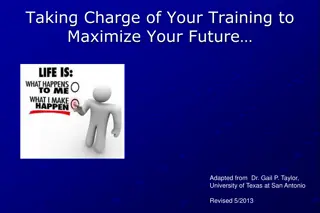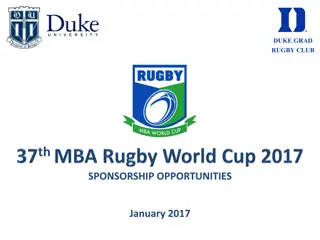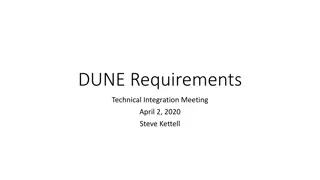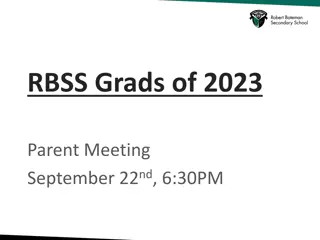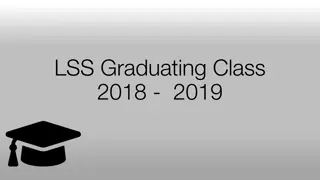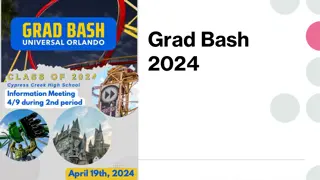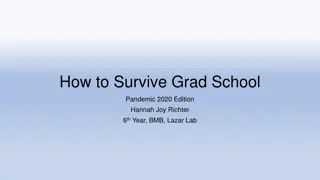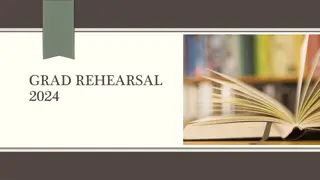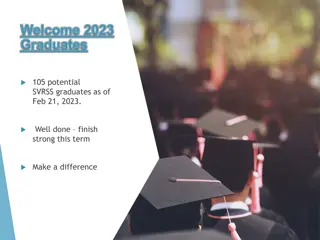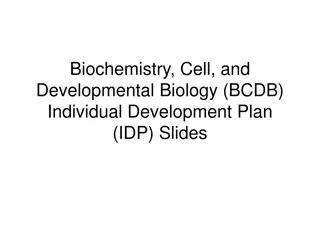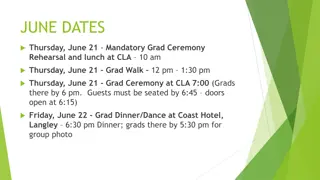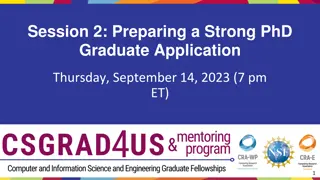
Graduation Requirements Reform: HB 3278/HB 2672 and Pathway to Career Success
Explore the Graduation Requirements Reform through HB 3278 and HB 2672, focusing on flexible attainment of educational requirements, career-focused courses, and work-based learning. Learn about the timeline and mandatory changes for students, along with details on locally approved courses. Ensure every student finds their pathway to career success!
Download Presentation

Please find below an Image/Link to download the presentation.
The content on the website is provided AS IS for your information and personal use only. It may not be sold, licensed, or shared on other websites without obtaining consent from the author. If you encounter any issues during the download, it is possible that the publisher has removed the file from their server.
You are allowed to download the files provided on this website for personal or commercial use, subject to the condition that they are used lawfully. All files are the property of their respective owners.
The content on the website is provided AS IS for your information and personal use only. It may not be sold, licensed, or shared on other websites without obtaining consent from the author.
E N D
Presentation Transcript
Graduation Requirements Reform HB 3278/HB 2672
Goal Every student finding their pathway to career success! What does that mean?? Flexible attainment of educational requirements in secondary education. Integrating career focused courses and programs into secondary educational careers. A focus on educational training and work-based learning experience to highlight postsecondary opportunities.
Timeline Optional this year for schools or students (HB2672/conference bill)- passed on 5/30/2024, signed by Governor 6/14/2024 "Beginning with the 2024-2025 school year, students whose parent or legal guardian approve modification of the existing graduation track as outlined in subsections B and C of this section, subject to school approval, may complete a minimum of twenty-three (23) curriculum units or sets of competencies at the secondary level." Mandatory in 2025-2026 school year for students enrolled in the 8th grade (HB3278)- passed on 5/13/2024, signed by Governor 5/15/2024 "Beginning with students entering the eighth grade in the 2025-2026 school year, in order to graduate from a public high school accredited by the State Board of Education with a standard diploma, students shall complete a minimum of the following twenty-three (23) curriculum units or sets of competencies at the secondary level."
HB 2672 Language Beginning with the 2024-2025 school year, students whose parent or legal guardian approve modification of the existing graduation track as outlined in subsections B and C of this section, subject to school approval, may complete a minimum of twenty-three (23) curriculum units or sets of competencies at the secondary level as listed below; and students entering the eighth grade in the 2025- 2026 school year, in order to graduate from a public high school accredited by the State Board of Education with a standard diploma, students shall complete a minimum of the following twenty-three (23) curriculum units or sets of competencies at the secondary level.
HB 2672 Language Continued A school district shall determine the specific description of the locally approved math and science-based application courses allowed pursuant to paragraphs 2 and 3 of subsection D of this section. Formal notification with the specific course description shall be provided to the State Department of Education prior to July 1 of each school year. The notification shall include what courses will be coded as locally approved math and science-based application courses for the ensuing school year.
23 Units or Sets of Competencies are Required to meet State Graduation Requirements: (4) English (4) Mathematics (3) Laboratory Science (3) History & Citizenship (6) Pathway Courses (3) Approved by Local School Board
English (no change) Four units or sets of competencies of English to include: Grammar Composition Literature or any English course approved for college admission requirements
Mathematics (can begin in 8th grade) Four units or sets of competencies of mathematics, two of which shall be: Algebra I and either Algebra II or Geometry. The other two units may include: Computer Science College courses approved for dual credit Approved full-time postsecondary career and technology program Locally approved math-based application course or any mathematics course with content and/or rigor above Algebra I Algebra II Geometry Trigonometry Math Analysis Calculus Statistics Math of Finance
Students taking Algebra 1, Geometry or Algebra 2 before 8th grade: >The units or sets of competencies in mathematics required in subsection B, C, or D of this section may be completed at any time during the eighth through twelfth grades. If a student completes any required courses or sets of competencies in mathematics prior to eighth grade, the student may take any other mathematics courses or sets of competencies to fulfill the requirement to complete the units or sets of competencies in grades eight through twelve after the student has satisfied the requirements of subsection B, C, or D of this section.
Laboratory Science (same language as the CORE path) Three units or sets of competencies of laboratory science approved for college admission requirements including one unit or set of competencies of life science meeting the standards for Biology I; one unit or set of competencies of physical science meeting the standards for Physical Science, Chemistry, or Physics and one unit or set of competencies from the domains of: physical science life science or earth and space science or approved fulltime postsecondary career and technology program or locally approved science-based application course or any science course with content and/or rigor above Biology I or Physical Science
Anything not specifically listed in the bill or not having content and/or rigor above Algebra I, for math, must be approved by the local school board. Anything not specifically listed in the bill or not having content and/or rigor above Physical Science or Biology I, for science, must be approved by the local school board. Formal notification with the specific course description shall be provided to the State Department of Education prior to July 1 of each school year. The notification shall include what courses will be coded as locally approved math and science based application courses for the ensuing school year.
History and Citizenship (no change) Three units or sets of competencies of history and citizenship skills including: One unit of American History 1/2 unit of Oklahoma History 1/2 unit of United States Government and one unit from the subjects of: History Government Geography Economics Civics or non-western culture and approved for college admission requirements
Pathway Units Six pathway units or sets of competencies approved at the discretion of the school district board of education which align with each student's Individual Career and Academic Plan (ICAP) and may include, but are not limited to, any additional units or sets of competencies as provided in paragraphs 1 through 4 of this subsection (slide 6-9) World or non-English language Computer technology Junior Reserve Officers' Training Corps (JROTC) Internship or apprenticeship programs Career and technology education courses Concurrently enrolled courses Advanced placement courses International Baccalaureate courses approved for college admission requirements, Music, art, drama, speech, dance, media arts, or other approved courses
Approved by Local School Board Three units or sets of competencies of elective courses approved by the school district board of education Example from an Oklahoma School: A district is asking their teachers to submit a course syllabi and an outline addressing why their course could be used as either a math or science application course.
Resources new-grad-req-banner Okcareer.tech/ccd
Definitions Contextual methodology - academic content and skills taught by utilizing real-world problems and projects in a way that helps students understand the application of that knowledge Locally approved - approved by the local school district board of education Math based application course - a course that teaches math content within a real-world application Pathway unit - a course taken by a high school student that is aligned with the student's current Individualized Career and Academic Plan (ICAP)
Scenarios Student is in a full-time welding program at a Technology Center, can I use that as a 3rd and 4th math? I have a student athlete, what courses will count for NCAA based on the new graduation requirements? Is a student still required to take (2) World/Non-English Language or Computer Technology?
Oklahoma Promise: 2 new bills for 24/25 SB 1302- Amends OK Promise Requirements SB 1328- Allows students on a Core Graduation Pathway to be eligible to use OK Promise for Have completed the core curriculum and be seeking admission to a technology center school overseen by the State Board of Career and Technology Education. Students shall also have attained a 2.5 grade point average in the core curriculum courses.
Important CTE Transcripting Information >Transcripting a full time program that is satisfying a 3rd/4th Math or 3rd Science: How to show on transcript: If a student has chosen a career pathway and is taking a three-hour career and technology program in place of a third or fourth math credit, the subject code for the course they are taking is recorded on the transcript. Then, a comment should be added to the transcript stating that the third or fourth math requirement for graduation has been satisfied by [course or program name/code].
The OKCareerGuide team has created multiple opportunities to provide you with the training you need, both face-to-face and online. You ll find regularly scheduled webinars, links to our latest material on YouTube, basic training guides and more here.
Help Is Available Oklahoma Department of CareerTech: okcareer.tech/ccd Shawna Nord, Manager Counseling and Career Development 405-743-5524, shawna.nord@careertech.ok.gov Julie Childers, Academic Coordinator 405-743-5110, julie.childers@careertech.ok.gov Oklahoma State Department of Education Christi Sturgeon, Program Manager- Comprehensive School Counseling 405-522-3263, christi.sturgeon@sde.ok.gov

